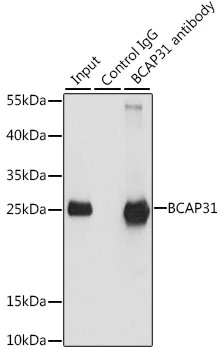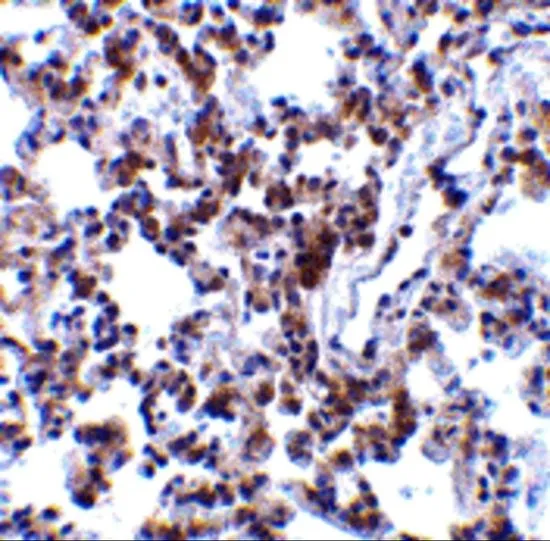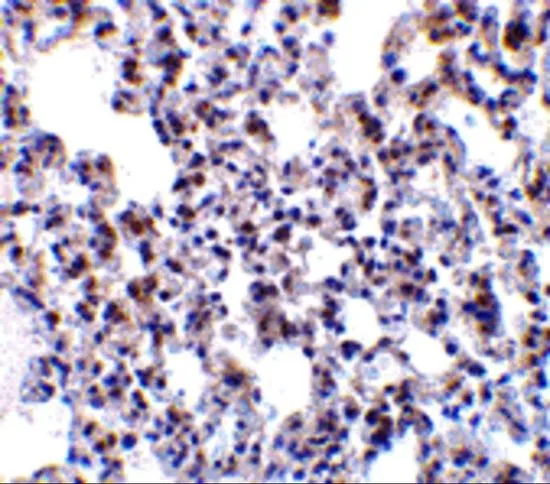![IHC-Fr analysis of baboon adrenal gland tissue using GTX15044 BCAP31 antibody [CC-1]. IHC-Fr analysis of baboon adrenal gland tissue using GTX15044 BCAP31 antibody [CC-1].](https://www.genetex.com/upload/website/prouct_img/normal/GTX15044/GTX15044_2035_IHC-Fr_w_23060620_270.webp)
IHC-Fr analysis of baboon adrenal gland tissue using GTX15044 BCAP31 antibody [CC-1].
BCAP31 antibody [CC-1]
GTX15044
ApplicationsImmunoFluorescence, ImmunoPrecipitation, Western Blot, ELISA, ImmunoCytoChemistry, ImmunoHistoChemistry, ImmunoHistoChemistry Frozen
Product group Antibodies
ReactivityBovine, Hamster, Human, Mouse, Primate
TargetBCAP31
Overview
- SupplierGeneTex
- Product NameBCAP31 antibody [CC-1]
- Delivery Days Customer9
- Application Supplier NoteWB: 1:1,500 - 1:6,000. ICC/IF: 1:200-1:1000. IHC-Fr: 1:1000 - 1:10000. *Optimal dilutions/concentrations should be determined by the researcher.Not tested in other applications.
- ApplicationsImmunoFluorescence, ImmunoPrecipitation, Western Blot, ELISA, ImmunoCytoChemistry, ImmunoHistoChemistry, ImmunoHistoChemistry Frozen
- CertificationResearch Use Only
- ClonalityMonoclonal
- Clone IDCC-1
- ConjugateUnconjugated
- Gene ID10134
- Target nameBCAP31
- Target descriptionB cell receptor associated protein 31
- Target synonyms6C6-AG, BAP31, CDM, DDCH, DELXQ28, DXS1357E, MICRODELXq28, B-cell receptor-associated protein 31, 6C6-AG tumor-associated antigen, BCR-associated protein Bap31, p28 Bap31
- HostRat
- IsotypeIgG2a
- Protein IDP51572
- Protein NameB-cell receptor-associated protein 31
- Scientific DescriptionThis gene encodes a member of the B-cell receptor associated protein 31 superfamily. The encoded protein is a multi-pass transmembrane protein of the endoplasmic reticulum that is involved in the anterograde transport of membrane proteins from the endoplasmic reticulum to the Golgi and in caspase 8-mediated apoptosis. Microdeletions in this gene are associated with contiguous ABCD1/DXS1375E deletion syndrome (CADDS), a neonatal disorder. Alternative splicing of this gene results in multiple transcript variants. Two related pseudogenes have been identified on chromosome 16. [provided by RefSeq, Jan 2012]
- ReactivityBovine, Hamster, Human, Mouse, Primate
- Storage Instruction-20°C or -80°C,2°C to 8°C
- UNSPSC12352203

![WB analysis of samples using GTX15044 BCAP31 antibody [CC-1]. WB analysis of samples using GTX15044 BCAP31 antibody [CC-1].](https://www.genetex.com/upload/website/prouct_img/normal/GTX15044/GTX15044_2092_WB_w_23060620_598.webp)
![ICC/IF analysis of Hela cells using GTX15044 BCAP31 antibody [CC-1]. Cells were probed without (left) or with(right) an antibody. Green : Primary antibody Blue : Nuclei Red : Actin Fixation : Formalin Permeabilization : 0.1% Triton X-100 in TBS for 5-10 minutes Dilution : 1:200 incubated overnight at 4oC ICC/IF analysis of Hela cells using GTX15044 BCAP31 antibody [CC-1]. Cells were probed without (left) or with(right) an antibody. Green : Primary antibody Blue : Nuclei Red : Actin Fixation : Formalin Permeabilization : 0.1% Triton X-100 in TBS for 5-10 minutes Dilution : 1:200 incubated overnight at 4oC](https://www.genetex.com/upload/website/prouct_img/normal/GTX15044/GTX15044_249_ICC-IF_w_23060620_556.webp)
![ICC/IF analysis of MCF-7 cells using GTX15044 BCAP31 antibody [CC-1]. Cells were probed without (left) or with(right) an antibody. Green : Primary antibody Blue : Nuclei Red : Actin Fixation : Formalin Permeabilization : 0.1% Triton X-100 in TBS for 5-10 minutes Dilution : 1:200 incubated overnight at 4oC ICC/IF analysis of MCF-7 cells using GTX15044 BCAP31 antibody [CC-1]. Cells were probed without (left) or with(right) an antibody. Green : Primary antibody Blue : Nuclei Red : Actin Fixation : Formalin Permeabilization : 0.1% Triton X-100 in TBS for 5-10 minutes Dilution : 1:200 incubated overnight at 4oC](https://www.genetex.com/upload/website/prouct_img/normal/GTX15044/GTX15044_250_ICC-IF_w_23060620_839.webp)
![ICC/IF analysis of NIH-3T3 cells using GTX15044 BCAP31 antibody [CC-1]. Cells were probed without (left) or with(right) an antibody. Green : Primary antibody Blue : Nuclei Red : Actin Fixation : Formalin Permeabilization : 0.1% Triton X-100 in TBS for 5-10 minutes Dilution : 1:200 incubated overnight at 4oC ICC/IF analysis of NIH-3T3 cells using GTX15044 BCAP31 antibody [CC-1]. Cells were probed without (left) or with(right) an antibody. Green : Primary antibody Blue : Nuclei Red : Actin Fixation : Formalin Permeabilization : 0.1% Triton X-100 in TBS for 5-10 minutes Dilution : 1:200 incubated overnight at 4oC](https://www.genetex.com/upload/website/prouct_img/normal/GTX15044/GTX15044_251_ICC-IF_w_23060620_641.webp)



![WB analysis of various samples using GTX03245 BCAP31 antibody [GT1333]. Dilution : 1:1000 Loading : 25microg per lane](https://www.genetex.com/upload/website/prouct_img/normal/GTX03245/GTX03245_19_WB_w_23053123_866.webp)


![WB analysis of membrane enriched extracts (30microg lysate) of COS-7 (Lane 1), Raji (Lane 2), Molt-4 (Lane 3), HeLa (Lane 4), MCF7 (Lane 5), K-562 (Lane6), Hep G2 (Lane 7), Jurkat (Lane 8), HT-1080 (Lane 9) and HEK-293 (Lane 10) using GTX15045 BCAP31 antibody [CC-4]. Dilution : 1:1500](https://www.genetex.com/upload/website/prouct_img/normal/GTX15045/GTX15045_1490_WB_w_23060620_434.webp)